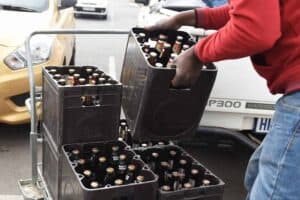Seventy percent of those who applied for the grant were below the age of 34 years.

The Department of Social Development has released a report that looked into the Special Covid-19 Social Relief of Distress (SRD) R350 grant.
Covid-19 Grant
President Cyril Ramaphosa first announced the special grant in April 2020 as part of the government’s R500 billion stimulus package, after Covid-19 hits the shores of South Africa.
The SRD grant was introduced and aimed at those aged between 18 and 59 years without any source of income support and those facing undue hardships due to unemployment during the Covid-19 pandemic.
ALSO READ: Sassa investigating 177,000 public servants receiving social grants
It then came to an end in April this year after Ramaphosa confirmed the extension for a further three months during his State of the Nation Address (Sona) in February.
However, the grant was reinstated in July, which will continue to be paid out until the end of March 2022.
The grant was also extended to eligible unemployed caregivers who currently receive a child support grant.
Grant report
Dr Wiseman Khehla Magasela – the executive director of Clermont Analytics – delivered the report, dubbed “the Rapid Assessment of the Implementation and Utilisation of the Special Covid-19 SRD Grant”, on Thursday morning.
Clermont Analytics – a research, policy development and advisory forum – based its findings on qualitative research through in-depth interviews with respondents who applied for the grant.
Below is a summary of the key findings from the report:
1. Food and electricity
Food was the most bought item with the R350 grant, which accounted for 93%.
“Food is by far the one single item that the special Covid-19 SRD grant was used for by those who received the grant. Ninety-three percent of those who received the grant used it to buy food. The second item in the list was a very low 20% and that was used to purchase electricity,” Magasela said.
2. Age
Seventy percent of those who applied for the grant were below the age of 34 years old.
“Now that relates to South Africa’s very high unemployment in your under-35 age group. The recent statistics indicate that up to 74% of those who fall in this age group are without jobs.”
“Therefore, it is indicative of the numbers that applied [for the grant] is very high.”
Magasela also said 70% of the grant applicants had matric and higher education qualifications.
“We need to remember part of the criteria was that you have to have no income,” he said.
3. Urban bias
Magasela said the research also looked at grant recipients who lived in metro areas compared to those in non-metro areas.
“We found evidence of an urban bias. In KZN [KwaZulu-Natal], in the eThekwini municipality had by far the largest proportion of applicants for the Special Covid-19 SRD.”
“In the Cape Town municipality, there was an urban bias. The important question is the following: why was that the case?”
“How do we balance and make sure there are equal applications from both urban and non-urban areas and also in the receipt of the grant?”
He added that black Africans made up 83% of those who applied for the grant.
4. Household
Seventy percent of those who applied for the grant live in households of four or more members.
“If we were to group the households in terms of those who applied […] a significant percentage of them live in households with four or more members. Meaning that the grant was going through households that have significant members.”
5. No ID or phone
Magasela said the top two reasons some were not able to apply for the grant was because they did not have a cellphone or an ID document.
Payouts
Meanwhile, the South Africa Social Security Agency (Sassa) has extended the date for collection of the unclaimed R350 grants to 30 November.
This means that beneficiaries whose funds were forfeited in August this year can still collect their money at the Post Office after Social Development Minister Lindiwe Zulu approved the extension.
READ MORE: Black Sash still wants R350 Covid-19 grant increased
Payments not withdrawn by the end of November will be forfeited to the state to fund other government priorities, according to Sassa CEO Busisiwe Memela-Khambula.
Last month, Sassa revealed that it had received close to 14 million applications.
The agency said more than 8.3 million applications were approved, and over 5.6 million applicants were paid in September.






